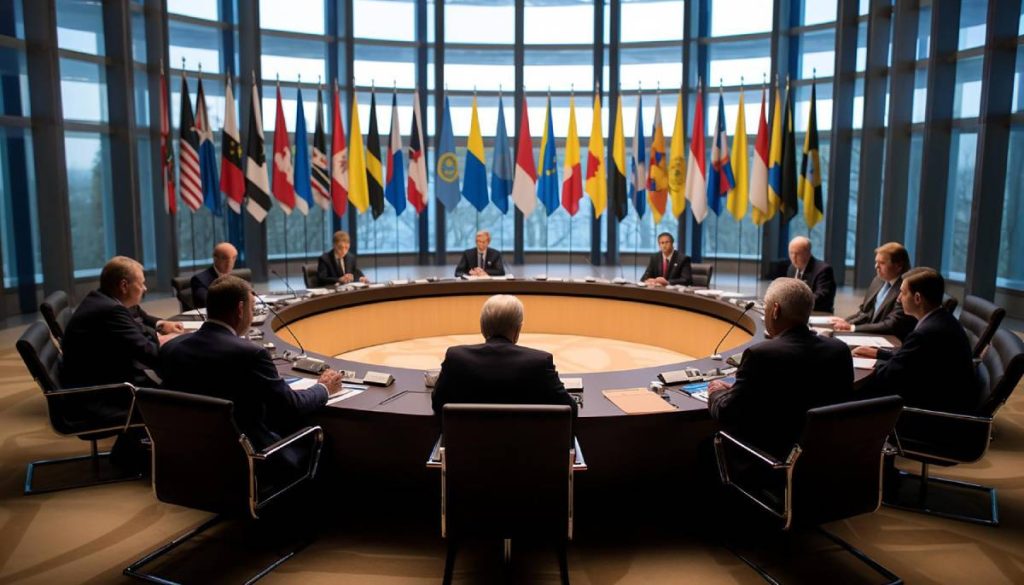The recent NPR PBS funding cuts, initiated through a controversial executive order by President Trump, have sparked a vigorous response from leadership within both organizations. NPR and PBS CEOs are firmly contesting this move, emphasizing its dire implications for local news stations and educational programming. “We’re exploring all available options,” said NPR CEO Katherine Maher, highlighting the immediate threat to journalism in rural areas. With a looming lack of public funding, essential children’s programming and community-specific news coverage could vanish, leaving vast swathes of the population without crucial sources of information. These funding challenges are not merely administrative; they pose real risks to the quality and accessibility of media that sustain informed public discourse.
In light of recent events, the ongoing debate surrounding financial support for public broadcasting is becoming increasingly critical. The potential loss of financial resources from federal and local sources threatens the survival of vital media entities that serve as cornerstones of community information and children’s entertainment. Executives from these institutions are rallying to highlight the risks associated with diminished federal assistance, particularly as it pertains to sustaining quality journalism and educational content. The consequences of this proposed funding withdrawal resonate beyond the immediate budgetary concerns and impact societal access to fair and informative news. As discussions of public funding for PBS children’s programming and NPR’s local news initiatives continue, the broader conversation about the role of government in supporting public media is more relevant than ever.
Understanding NPR and PBS Funding Challenges
The funding challenges faced by NPR and PBS have historically been a topic of significant discussion as public media organizations navigate their financial landscapes. With President Trump’s executive order aiming to terminate public funding, these challenges have intensified. Organizations like NPR, which derives a part of its funding from federal support, are particularly vulnerable. The potential elimination of budget allocations could greatly hinder their ability to deliver on their mission of providing reliable news coverage, especially in underserved rural areas. Consequently, the viability of many essential services, particularly local news, comes into question.
Federal funding is crucial for NPR and PBS, as it helps fortify their operations and ensures that they can continue to serve communities effectively. NPR’s expansive network of over 240 member stations provides a vital lifeline for local journalism, which can be severely impacted by funding cuts. This is particularly important in an era where news deserts are proliferating in the United States, leaving many citizens without easy access to critical information and journalism that speaks to their communities. Without public support, these organizations face immense pressures that could compromise journalistic integrity and accessibility.
The Impact of Public Funding Cuts on Local News
Public funding cuts proposed by the Trump administration could have dire repercussions for local news stations that rely heavily on federal dollars. NPR CEO Katherine Maher highlighted that local news outlets, especially in rural regions, are already grappling with the challenges of providing comprehensive news coverage. The potential loss of funding exacerbates this situation, as these stations struggle not just with operating costs but also with maintaining the quality and breadth of news reporting that communities depend on. This shift towards news deserts could leave many Americans without access to local stories that matter most to them, leading to a more informed populace.
Moreover, the influence of public funding is not limited to news alone but extends to shaping vital community aspects such as public education and culture. NPR and PBS’s programming often serves as a platform for underserved communities, providing news coverage that reflects diverse perspectives. Cuts to funding could stifle these critical narratives and further marginalize communities already at risk of being silenced. The vibrant tapestry of American culture that public broadcasting aims to reflect may face a significant threat if federal funding disappears, making it essential to advocate for these public resources.
Implications for Children’s Programming Funding
Children’s programming is one of the most critical components of NPR and PBS, designed to educate and entertain young audiences. PBS CEO Paula Kerger pointed out that a significant portion of PBS’s funding supports programs like “Sesame Street” and “Mister Rogers’ Neighborhood,” which have been instrumental in early childhood education for decades. Loss of public funding would halt the development of new content and resources, impacting the quality and accessibility of such programming for millions of children across the United States. With half of children not enrolled in formal pre-K programs, these shows play a crucial role in early learning.
In addition, public funding not only sustains existing programming but also contributes to partnerships with preschool providers and parents, enhancing educational initiatives. In light of potential cuts, the consequences could be sweeping; the immediate effects would halt innovations in early childhood education television, potentially leaving a gap in quality educational content available to families. The repercussions of depriving children of such valuable resources extend far beyond entertainment, impacting their cognitive and social development.
NPR PBS Funding Cuts and Their Broader Consequences
The announcement of potential NPR PBS funding cuts has stirred widespread concern among media experts and the general public alike. The decision reflects broader political decisions that could reshape the media landscape. As NPR and PBS look to challenge these funding cuts in courts, the focus remains on the essential services they provide. Such funding is not merely about financial survival; it represents a critical commitment to ensuring that diverse voices and important stories are part of the national dialogue. The broader consequences of these cuts could weaken not only public media but also the fabric of local communities that benefit from these narratives.
Additionally, NPR and PBS don’t just influence news; they also shape public opinion and culture. With many organizations around the country filing lawsuits against the federal order, the ensuing battle signifies a pivotal moment for public broadcasting. Many advocates argue that the cuts would create a systemic shift that threatens the essential role of public media in fostering an informed democracy. The outcome could set precedents that redefine public media funding and its pivotal role in community engagement and information dissemination.
The Legal Battle Amidst Funding Uncertainties
As NPR and PBS prepare to contest the Trump administration’s executive orders, lawyers and advocates are gearing up for a significant legal battle. Following the announcement of hundreds of lawsuits aimed at halting executive actions regarding public media funding, it has become clear that the fight extends beyond just financial concerns. It concerns the values we place on public service journalism and the importance of having diverse media entities that represent all citizens. The legal ramifications could reshape the landscape of public funding for years to come.
The legal proceedings will not only address the immediate financial needs of NPR and PBS but also hinge on policies surrounding public broadcasting. As these organizations bring their case to court, implications could arise that might influence future funding structures and accountability of public funds. Observers are closely watching the outcomes, recognizing that they can provide insights into how the federal government interacts with public media in the long-term. The future of NPR and PBS, as pivotal components of American media, is resting on this crucial legal battle.
The Importance of Advocacy in Public Broadcasting
Advocacy plays a vital role in ensuring the survival of public broadcasting entities like NPR and PBS. As funding challenges intensify, mobilizing community support becomes crucial in influencing policy discussions and reinforcing the essential nature of public media. Awareness campaigns can help highlight the significant contributions of these organizations to local and national conversations, emphasizing their role in delivering unbiased news and educational content. The call to action for supporters is clear: they must engage in advocacy efforts to ensure public funding remains intact.
Furthermore, involvement doesn’t just end at awareness; it extends to reaching out to policymakers and encouraging them to uphold the values of public broadcasting. Grassroots initiatives can build momentum that not only showcases the necessity for public funds but also fosters a strong base of supporters who continue to advocate for public services. As public broadcasting faces unprecedented challenges, community backing becomes pivotal to securing the resources necessary for reliable and impactful journalism.
Responding to Community Needs through Public Programming
Public broadcasting organizations like NPR and PBS have always been responsive to the needs of communities they serve. The contention surrounding funding cuts from the federal government raises important questions about how these entities will continue to adapt to serve the populace effectively. By aiming their programming at local needs, they can remain flexible and responsive in emergencies, providing timely and relevant information when it matters most.
With NPR’s commitment to local journalism and PBS’s focus on educational content, both organizations have the potential to play critical roles in addressing pressing community issues. The challenge remains that without adequate funding, their capacity to innovate and respond to diverse community needs will be heavily inhibited. Allowing public broadcasting organizations to fade due to financial issues will affect not just media availability, but also the informed engagement of citizens, ultimately impacting democracy itself.
Future Prospects for NPR and PBS in Changing Political Landscapes
As NPR and PBS navigate the changing political landscape, their future prospects depend on how effectively they can adapt to new funding realities and continue to engage with their audiences. The changing administration and the accompanying shifts in policy provide new challenges, but also opportunities for these organizations to redefine their strategies. There is an ongoing dialogue about the importance of public media in fostering democracy through quality journalism and diverse programming.
Exploring alternative funding models, such as increased collaboration with local businesses and community investors, may become integral for NPR and PBS as they seek financial stability. The potential for innovation in monetization while maintaining the integrity of public service broadcasting can pave the way for a more sustainable future. Facing a continuing push from advocates for public media, the upcoming periods will be critical for determining how NPR and PBS respond not just to challenges but to opportunities in ways that uphold their legacy.
Frequently Asked Questions
What are the implications of NPR PBS funding cuts on local news coverage?
NPR PBS funding cuts could severely impact local news coverage as local stations rely heavily on public funding. With many newsrooms across the country facing budget constraints, these cuts may lead to the closure of critical reporting outlets, particularly in rural areas where access to local news is already limited. This could create news deserts, leaving 20% of Americans without a reliable source of community news.
How do NPR funding challenges affect educational children’s programming?
NPR funding challenges resulting from potential PBS funding cuts threaten the development of educational children’s programming, which is vital for many children not enrolled in formal pre-K. Federally funded programs support the creation of shows like ‘Sesame Street’ and ‘Mister Rogers’ Neighborhood,’ and losing this funding would halt new educational initiatives that facilitate early childhood learning.
What was the response of NPR and PBS to the Trump executive order on funding cuts?
In response to the Trump executive order aiming to eliminate public funding for NPR and PBS, both organizations have committed to contesting the cuts vigorously. NPR CEO Katherine Maher and PBS CEO Paula Kerger emphasized their determination to explore all available options, demonstrating their commitment to protecting their funding and the vital services they provide to their audiences.
How significant is public funding for PBS’s operational budget?
Public funding is crucial for PBS’s operational budget, accounting for 15% of its overall revenue. For some PBS stations, especially those in smaller communities, federal funding can represent 40% to 50% of their total budget. This reliance underscores the potential devastation that NPR PBS funding cuts could have on their ability to sustain operations and continue delivering quality programming.
What impact could NPR PBS funding cuts have on programming for children?
NPR PBS funding cuts could have a profound impact on programming for children, impeding the creation and development of new educational shows. PBS has long collaborated with preschool providers and parents to support children’s programming initiatives. The loss of funding would not only halt current projects but also jeopardize future educational content crucial for young audiences, especially those lacking access to early childhood education resources.
| Key Point | Details |
|---|---|
| CEOs’ Response | NPR and PBS CEOs are contesting Trump’s executive order to cut public funding. |
| Statement from NPR | NPR CEO Katherine Maher emphasized the devastating impact on local news stations and rural audiences. |
| Impact on Local News | Cuts could severely hinder local journalists and contribute to ‘news deserts’. |
| Federal Funding Percentage | PBS receives 15% of its funding from the federal government, vital for smaller stations. |
| Programs Affected | Educational children’s programs like “Sesame Street” could be disrupted. |
| Consequences for Children | PBS programming supports half of the children in America who aren’t in formal pre-K. |
Summary
NPR PBS funding cuts represent a critical issue as both organizations face severe repercussions from President Trump’s executive order to terminate public funding. This potential funding loss not only threatens the stability of local news stations but also endangers the creation of essential educational programs for children. The executives, including NPR’s Katherine Maher and PBS’s Paula Kerger, have expressed their commitment to contesting this decision, highlighting the profound impact it could have on audiences, especially in rural areas. The situation calls for immediate attention to preserve public broadcasting and its invaluable services.



